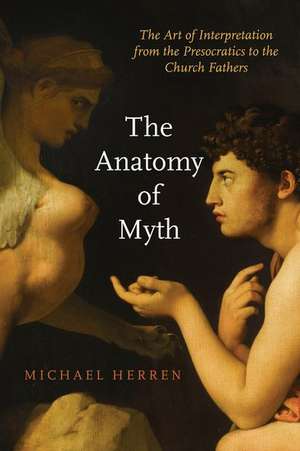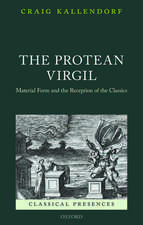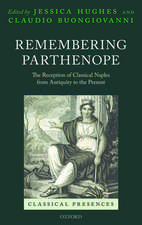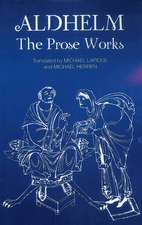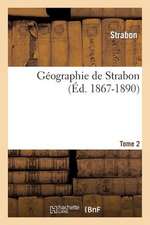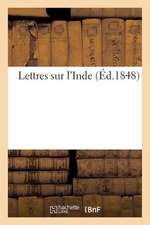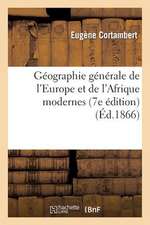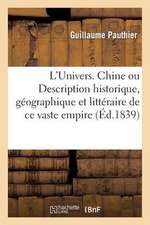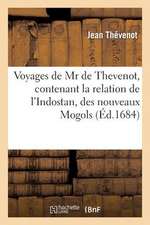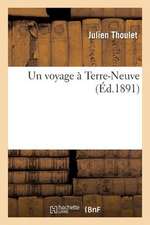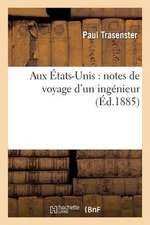The Anatomy of Myth: The Art of Interpretation from the Presocratics to the Church Fathers
Autor Michael Herrenen Limba Engleză Paperback – 21 dec 2018
| Toate formatele și edițiile | Preț | Express |
|---|---|---|
| Paperback (1) | 215.78 lei 31-37 zile | |
| Oxford University Press – 21 dec 2018 | 215.78 lei 31-37 zile | |
| Hardback (1) | 568.40 lei 10-16 zile | |
| Oxford University Press – 22 feb 2017 | 568.40 lei 10-16 zile |
Preț: 215.78 lei
Preț vechi: 245.84 lei
-12% Nou
Puncte Express: 324
Preț estimativ în valută:
41.29€ • 44.84$ • 34.69£
41.29€ • 44.84$ • 34.69£
Carte tipărită la comandă
Livrare economică 12-18 aprilie
Preluare comenzi: 021 569.72.76
Specificații
ISBN-13: 9780190936723
ISBN-10: 019093672X
Pagini: 250
Dimensiuni: 155 x 231 x 15 mm
Greutate: 0.41 kg
Editura: Oxford University Press
Colecția OUP USA
Locul publicării:New York, United States
ISBN-10: 019093672X
Pagini: 250
Dimensiuni: 155 x 231 x 15 mm
Greutate: 0.41 kg
Editura: Oxford University Press
Colecția OUP USA
Locul publicării:New York, United States
Recenzii
The value of Herren's book should not be underestimated, and I unequivocally recommend it to anyone interested in the history of myth and myth criticism. It is easy and enjoyable to read and filled with a fascinating array of information, making connections that shape into clear and compelling arguments. Tracing different threads through centuries of discussion leaves the reader a dynamic overview of not only contributions of classical authors to ways of interpreting or anatomizing myths, but also how these relate to one another, evolve over time, and link to the cultures and historical contexts in which they emerged and progressed.
An insightful and accessible analytical overview that so many of us need... The value of Herren's book should not be underestimated, and I unequivocally recommend it to anyone interested in the history of myth and myth criticism. It is easy and enjoyable to read and filled with a fascinating array of information, making connections that shape into clear and compelling arguments.
This book is a superb presentation of approaches to Greek myth from the Presocratics down to the Church Fathers Together with a twenty-page glossary, this book is the most useful overview of myth in the ancient world that I have ever read, and I have read many overviews.
Summing Up: Optional. Lower- and upper-division undergraduates; general readers.
This book is a superb presentation of approaches to Greek myth from the Presocratics down to the Church Fathers. Michael Herren is Distinguished Research Professor of Classics Emeritus at York University. He offers incisive summaries of Homer and Hesiod, who together formed the Greek equivalent of the Bible. But even more, he focuses on ancient interpreters of Homer and Hesiod and of the cosmos in general. As he points out, many other ancient peoples had their own myths, but they did not have their own interpreters of them. Or at least those interpretations do not survive.
[Herren] claims to have intended his book for students, including those who have no classical knowledge, and it is indeed blissfully free from academic grandstanding or scholarly jargon. The sweep of the story is wide, and within the summary above there are many enjoyable digressions, such as a chapter on ancient historians discussing such things as the historicity of the Trojan War. A dense subject is made an easy read. But H. has also a serious purpose. He is concerned about the dangers of religious fundamentalism arising from the literalist interpretation of sacred books. His thesis is that the adoption by the Fathers of Greek methods on interpretation, including allegory, enabled the Church to avoid the fundamentalist trap as far as the Renaissance, and that the activity of interpreting authoritative texts, and the freedom to do so, has helped to create 'the society that we currently enjoy'.
Building on decades of classroom experience and scholarly research, Herren has produced a lively and original book that traces the evolution of classical myth from its archaic Greek origins down to the fifth C. CE. Both the teacher's irreverent and provocative voice and the scholar's sober one explain how myths are philosophized, allegorized, historicized, and invented. Herren gives Neoplatonic and Christian exegetes and the Jewish and Christian Bible their due. This thoughtful book links the history of myth to timeless and important intellectual issues such as monotheism, atheism, and modern debates on censorship, pornography, and violence."-Danuta Shanzer, University of Vienna
Herren's goal is to shed light on how ancient Greek developments paved the way for the 'open, pluralistic society' of the West today. Hence the main target of the book is a highly topical one: the 'persistence and growth of fundamentalist belief systems in our own times,' in counterpoint with secular forms of modern intellectual engagement with the biggest questions posed by life, and the 'new phenomenon' of a proselytizing atheism. The book resists obvious comparison or competitors, and the length, style, and general tone will work very well with undergraduates especially. A strong recommendation."-John Magee, University of Toronto
An insightful and accessible analytical overview that so many of us need... The value of Herren's book should not be underestimated, and I unequivocally recommend it to anyone interested in the history of myth and myth criticism. It is easy and enjoyable to read and filled with a fascinating array of information, making connections that shape into clear and compelling arguments.
This book is a superb presentation of approaches to Greek myth from the Presocratics down to the Church Fathers Together with a twenty-page glossary, this book is the most useful overview of myth in the ancient world that I have ever read, and I have read many overviews.
Summing Up: Optional. Lower- and upper-division undergraduates; general readers.
This book is a superb presentation of approaches to Greek myth from the Presocratics down to the Church Fathers. Michael Herren is Distinguished Research Professor of Classics Emeritus at York University. He offers incisive summaries of Homer and Hesiod, who together formed the Greek equivalent of the Bible. But even more, he focuses on ancient interpreters of Homer and Hesiod and of the cosmos in general. As he points out, many other ancient peoples had their own myths, but they did not have their own interpreters of them. Or at least those interpretations do not survive.
[Herren] claims to have intended his book for students, including those who have no classical knowledge, and it is indeed blissfully free from academic grandstanding or scholarly jargon. The sweep of the story is wide, and within the summary above there are many enjoyable digressions, such as a chapter on ancient historians discussing such things as the historicity of the Trojan War. A dense subject is made an easy read. But H. has also a serious purpose. He is concerned about the dangers of religious fundamentalism arising from the literalist interpretation of sacred books. His thesis is that the adoption by the Fathers of Greek methods on interpretation, including allegory, enabled the Church to avoid the fundamentalist trap as far as the Renaissance, and that the activity of interpreting authoritative texts, and the freedom to do so, has helped to create 'the society that we currently enjoy'.
Building on decades of classroom experience and scholarly research, Herren has produced a lively and original book that traces the evolution of classical myth from its archaic Greek origins down to the fifth C. CE. Both the teacher's irreverent and provocative voice and the scholar's sober one explain how myths are philosophized, allegorized, historicized, and invented. Herren gives Neoplatonic and Christian exegetes and the Jewish and Christian Bible their due. This thoughtful book links the history of myth to timeless and important intellectual issues such as monotheism, atheism, and modern debates on censorship, pornography, and violence."-Danuta Shanzer, University of Vienna
Herren's goal is to shed light on how ancient Greek developments paved the way for the 'open, pluralistic society' of the West today. Hence the main target of the book is a highly topical one: the 'persistence and growth of fundamentalist belief systems in our own times,' in counterpoint with secular forms of modern intellectual engagement with the biggest questions posed by life, and the 'new phenomenon' of a proselytizing atheism. The book resists obvious comparison or competitors, and the length, style, and general tone will work very well with undergraduates especially. A strong recommendation."-John Magee, University of Toronto
Notă biografică
Michael Herren, B.A. (Claremont), M.S.L. (Pontifical Institute of Medieval Studies), Ph.D. (Classics, Toronto), has published and lectured widely on the Latin literature and culture of late antiquity and the early Middle Ages. His work includes critical editions and translations, the history of texts, medieval mythography, and the study of Greek in the Middle Ages. He continues to teach and supervise students at York University and the University of Toronto.
